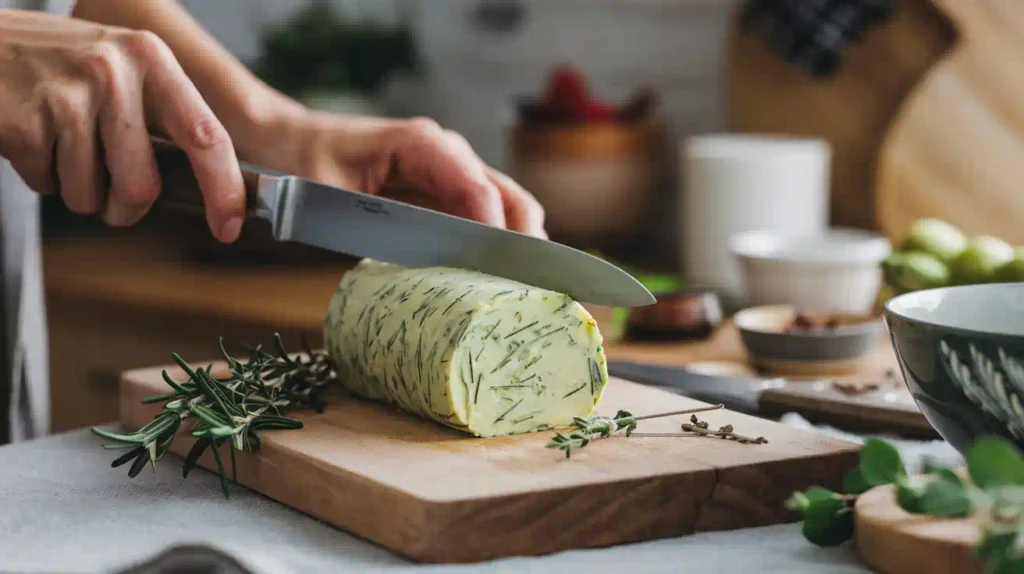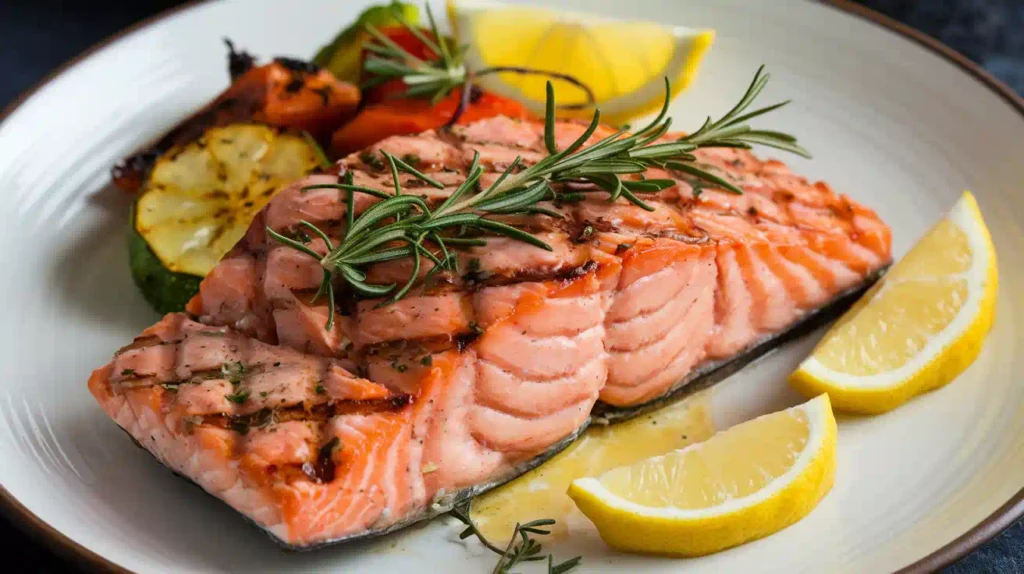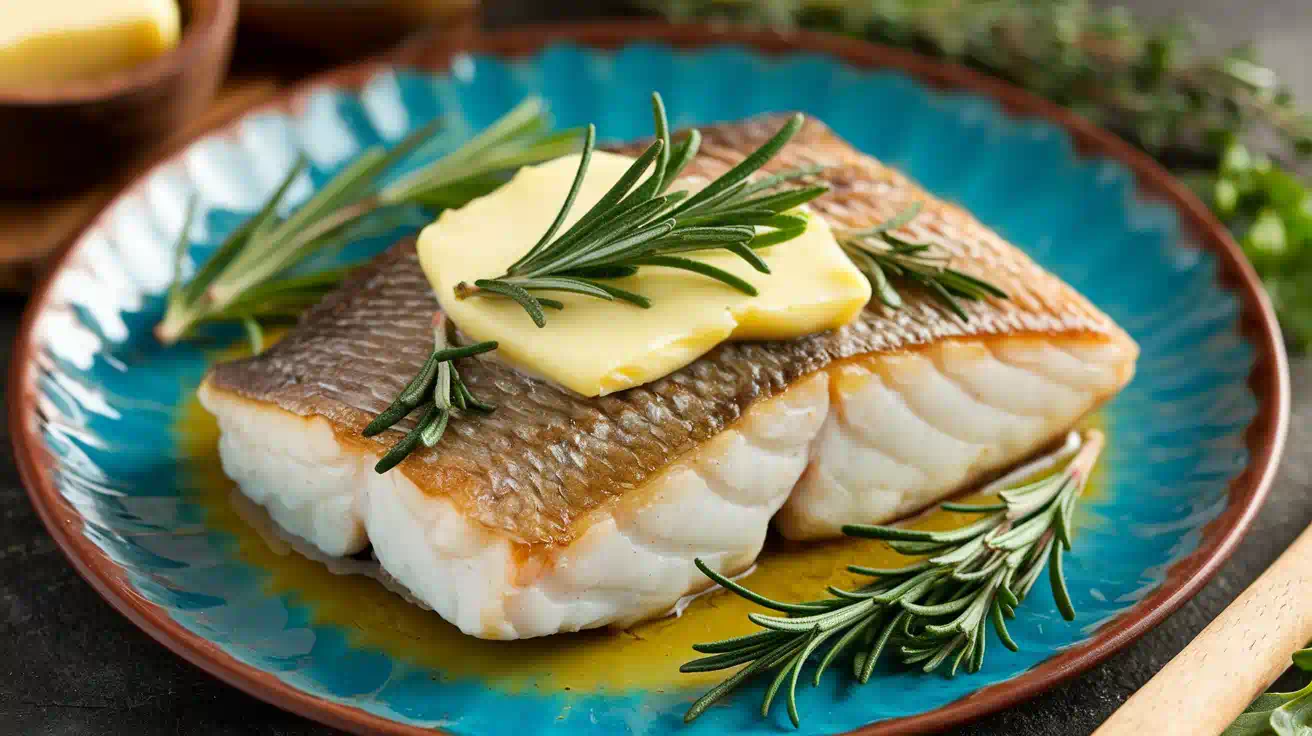Fish recipes can be flavorful yet simple, but adding rosemary thyme compound butter takes them to a whole new level. This herbed butter not only enhances the taste of your fish but also locks in moisture, making every bite delicious and satisfying. Whether you’re baking, grilling, or pan-searing, this butter is the secret ingredient to transform your fish dishes effortles
Introduction to Compound Butter for Fish
What is Compound Butter?
First things first—what exactly is compound butter? It’s essentially butter that has been whipped or softened and blended with additional ingredients like herbs, spices, or even zest. The result is a flavored butter that’s perfect for enhancing dishes, especially proteins like fish.
Imagine this: a velvety pat of butter melting over a piece of freshly cooked fish, infusing it with rich, aromatic flavors. Sounds amazing, doesn’t it?
Why Use Rosemary and Thyme?
So why rosemary and thyme? These herbs are a match made in culinary heaven, especially for fish. Rosemary has a bold, slightly piney flavor that complements the mildness of most fish. Thyme, on the other hand, brings an earthy, lemony aroma that balances the richness of the butter.
Together, they create a flavor profile that’s both sophisticated and comforting—a little like wrapping your fish in a warm, aromatic hug.
Benefits of Compound Butter in Cooking Fish
Using compound butter isn’t just about flavor—it’s also about convenience. Here are a few perks:
- Moisture Retention: Fish can dry out quickly, but compound butter helps lock in moisture.
- Even Cooking: The butter melts gradually, ensuring the herbs and spices distribute evenly.
- Presentation: Let’s be real—it looks fancy! A simple garnish of herbed butter can make your dish look like it came straight out of a gourmet kitchen.
“Cooking with compound butter is like having a secret weapon in your kitchen arsenal—it’s effortless yet incredibly effective.”
Ingredients for the Perfect Rosemary Thyme Compound Butter

Key Ingredients Explained
To make a stellar rosemary thyme compound butter, you’ll need just a handful of ingredients. Here’s the lineup:
| Ingredient | Quantity |
|---|---|
| Unsalted Butter | 1 cup (softened) |
| Fresh Rosemary | 1 tablespoon (chopped) |
| Fresh Thyme | 1 tablespoon (chopped) |
| Garlic (optional) | 1 clove (minced) |
| Lemon Zest | 1 teaspoon |
| Salt | A pinch |
| Black Pepper | A pinch |
- Unsalted Butter: Always go for high-quality butter; it’s the base, so it matters!
- Fresh Herbs: Fresh rosemary and thyme pack more punch than dried ones.
- Garlic & Lemon Zest: Optional but highly recommended for added depth and brightness.
Choosing the Right Butter
Not all butter is created equal. For this recipe, unsalted butter is your best bet—it allows you to control the seasoning. Also, make sure it’s softened but not melted; this ensures the herbs mix evenly.
Step-by-Step Guide to Making Rosemary Thyme Compound Butter

Preparation of Ingredients
Before diving in, get your ingredients prepped:
- Chop the rosemary and thyme finely. This ensures their flavors infuse the butter evenly.
- If using garlic, mince it into tiny pieces to avoid overpowering bites.
- Zest your lemon carefully; you want the zest, not the bitter white pith.
Mixing and Shaping the Butter
Now, let’s get to the fun part:
- Place the softened butter in a mixing bowl.
- Add the chopped herbs, garlic (if using), lemon zest, salt, and pepper.
- Use a fork or a hand mixer to blend everything until it’s well combined.
Once mixed, transfer the butter onto a piece of parchment paper. Roll it into a log, twisting the ends like candy wrappers. Pop it into the fridge for at least an hour to firm up.
Storage Tips for Compound Butter
Compound butter can be stored in the fridge for up to a week or frozen for up to three months. Wrap it tightly in plastic wrap or an airtight container to keep it fresh. Whenever you’re ready to use it, just slice off a piece and let it work its magic!
Best Fish Types to Pair with Rosemary Thyme Compound Butter

When it comes to pairing rosemary thyme compound butter with fish, not all types of fish are created equal. Some fish naturally complement the rich, aromatic flavors of the butter better than others. Let’s explore your best options!
Popular Fish Choices: Salmon, Cod, and Halibut
- Salmon: With its robust, slightly fatty flavor, salmon pairs beautifully with rosemary thyme compound butter. The butter melts into the fish, adding richness while enhancing its natural taste.
- Cod: Cod is a mild, flaky white fish that absorbs flavors like a sponge. The herb-infused butter turns this simple fish into a culinary masterpiece.
- Halibut: Known for its firm texture and clean taste, halibut works wonderfully with the earthy notes of rosemary and thyme.
If you’re feeling adventurous, you can also try this butter with trout, sea bass, or even swordfish. Each fish will take on its own unique twist with the buttery blend.
How to Match Butter with Fish Flavors
For those who prefer a mild and flaky option, white fish like cod or tilapia is a perfect canvas for rosemary thyme butter’s rich flavors.
Cooking Techniques Using Compound Butter with Fish
Now that you’ve got your fish and butter ready, let’s talk cooking methods. Each technique brings out different flavors and textures, so choose the one that fits your mood and meal plan.
Pan-Seared Fish with Compound Butter
Pan-searing is one of the easiest ways to cook fish, and adding rosemary thyme compound butter takes it to the next level. Here’s how you can do it:
- Heat a non-stick skillet over medium-high heat.
- Season your fish with salt and pepper.
- Add a small amount of oil to the pan and place the fish skin-side down (if applicable).
- Cook for 2-3 minutes, then flip the fish.
- Add a slice of compound butter to the pan and let it melt, basting the fish as it cooks.
“The sizzle of butter melting in a hot pan is the soundtrack of deliciousness.”
This technique creates a crispy exterior while keeping the inside tender and moist.
Grilled Fish Infused with Rosemary Thyme Butter
Grilling fish gives it a smoky, charred flavor that pairs incredibly well with compound butter. Here’s what to do:
- Preheat your grill to medium heat and oil the grates to prevent sticking.
- Brush your fish with a thin layer of oil and season lightly.
- Grill the fish for 3-4 minutes per side, depending on thickness.
- Once cooked, top the fish with a generous pat of rosemary thyme butter and let it melt over the surface.
Grilling is perfect for outdoor meals and adds a rustic vibe to your dish.
Baking Fish for a Juicy and Flavorful Dish
If you’re looking for a no-fuss method, baking is your best bet. It’s hands-off and delivers consistently tender results.
- Preheat your oven to 375°F (190°C).
- Place the fish in a baking dish lined with parchment paper.
- Add a dollop of compound butter on top of each piece of fish.
- Bake for 12-15 minutes, or until the fish flakes easily with a fork.
The butter melts as the fish bakes, enveloping it in flavor and keeping it moist.
Common Problems and Solutions When Using Compound Butter
Even with the best recipes, things don’t always go as planned. Let’s troubleshoot some common issues you might face with compound butter and how to fix them.
Problem: Butter Melting Too Quickly
This happens when the pan is too hot or the butter is added too early. The result? Burnt butter and unevenly cooked fish.
Solution: Add the butter in the final stages of cooking and reduce the heat. This ensures it melts gently, coating the fish without burning.
Problem: Overpowering Herb Flavors
Sometimes, the herbs can dominate the butter’s flavor, especially if you’re heavy-handed with rosemary.
Solution: Use herbs sparingly and balance them with complementary ingredients like garlic or lemon zest. A little goes a long way!
Problem: Butter Separating During Cooking
If your butter looks oily and separated, it’s usually because it was overheated.
Solution: Keep the cooking temperature moderate and use high-quality butter that’s less likely to break down.
Variations of Rosemary Thyme Compound Butter
Feeling adventurous? Rosemary thyme compound butter is versatile, and you can easily tweak the recipe to suit your taste or create new flavor profiles. Here are a few ideas to get you started:
Adding Garlic for a Richer Flavor
Looking for a way to create a Southern twist? Pair this butter with your favorite fish using this Hillbilly Fish Fry Seasonings Recipe for a unique take.
Experimenting with Lemon Zest for a Tangy Twist
If you want a lighter, citrusy flavor, add extra lemon zest or a splash of lemon juice. This variation is perfect for delicate white fish like cod or tilapia, giving it a bright, fresh taste that feels like summer on a plate.
“Don’t be afraid to experiment in the kitchen. Compound butter is like a blank canvas—you’re the artist!”
Health Benefits of Using Rosemary and Thyme in Cooking
Let’s not forget that rosemary and thyme are more than just tasty—they’re packed with health benefits, too. Here’s why you’ll want to include them in your diet:
Nutritional Profile of Rosemary and Thyme
| Nutrient | Rosemary | Thyme |
|---|---|---|
| Antioxidants | High | High |
| Vitamin C | Moderate | High |
| Vitamin A | High | Moderate |
| Anti-inflammatory | Yes | Yes |
Both herbs are rich in antioxidants, which help fight free radicals in the body. They also contain anti-inflammatory compounds that can support overall health.
How These Herbs Enhance Digestion and Immunity
Rosemary and thyme have long been used in traditional medicine for their digestive and immune-boosting properties. Rosemary can aid in reducing bloating, while thyme is known for its antimicrobial properties that help fight off infections. Who knew your butter could be so good for you?
How to Store and Reuse Compound Butter
Made a big batch? No worries—compound butter stores beautifully and can be reused in various dishes.
Freezing for Long-Term Use
To freeze your butter, roll it into a log, wrap it tightly in plastic wrap, and place it in an airtight container. It’ll keep for up to three months! When you need it, simply slice off a piece and pop it back in the freezer.
Reusing Compound Butter in Other Recipes
Don’t limit yourself to fish! Rosemary thyme compound butter works wonders on:
- Roasted vegetables
- Grilled chicken or steak
- Freshly baked bread
The possibilities are endless. Think of it as your go-to flavor enhancer for almost anything savory.
Frequently Asked Questions about Rosemary Thyme Compound Butter
Can I Use Dried Herbs Instead of Fresh?
Yes, but fresh herbs are preferred for their vibrant flavor. If you use dried herbs, reduce the quantity by half since they’re more concentrated.
How Long Does Compound Butter Last?
In the fridge, it lasts about a week. If frozen, it’s good for up to three months. Always store it in an airtight container to maintain its flavor.
Can I Use This Butter on Meats Other Than Fish?
Absolutely! This butter pairs well with chicken, beef, and even turkey. Its versatility makes it a staple in any kitchen.
Conclusion: Why Rosemary Thyme Compound Butter is a Game Changer for Fish Recipes
Rosemary thyme compound butter is one of those simple additions that delivers big results. It’s quick to make, easy to store, and elevates any fish dish from ordinary to extraordinary. Whether you’re grilling, baking, or pan-searing, this butter guarantees flavor and flair.
So what are you waiting for? Grab your butter, herbs, and a fish filet, and start cooking! Trust me—once you try it, you’ll never go back to plain fish again.
Call-to-Action: Try This Recipe Today and Transform Your Fish Dishes!
Go ahead and make your first batch of rosemary thyme compound butter. Play around with the variations, pair it with your favorite fish, and let your taste buds do the rest. Don’t forget to share your culinary creations with friends and family—they’ll be impressed, guaranteed!

